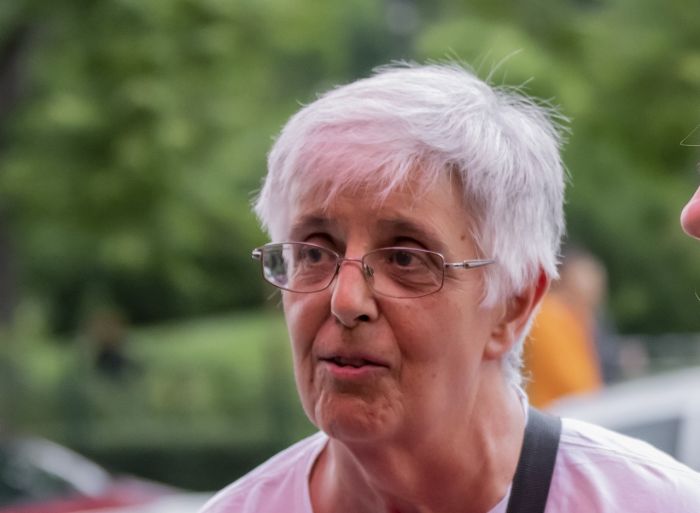 Because of her unusual, almost aggressive self-portraits, Mexican painter Frida Kahlo (1907-1954) is permanently inscribed in the painting of the 20th century, while she is preserved in the collective memory thanks to her energy and combativeness, her bus accident (1925) and her passionate relationship with the famous painter Diego Rivera (1886-1957), whom she married for the first time in 1929. Her strong will and uncompromising approach to problems were shown already in her early childhood when, as a six-year-old girl, she suffered from polio and, despite her disability, persistently tried to be like other children. The author's project of playwright Jelena Kovačić and director Anica Tomić "Little Frida" produced by the City Theatre "Žar ptica" Zagreb (Croatia) was inspired by Frida Kahlo's childhood in the family's Blue House (La Casa Azul) in the district of Coyoacan, Mexico City. The play was on stage on May 14, at the Third International Festival of Professional Theatres for Children and Youth "Novi Sad Theatre Festival" (May 8-15, 2024).
Because of her unusual, almost aggressive self-portraits, Mexican painter Frida Kahlo (1907-1954) is permanently inscribed in the painting of the 20th century, while she is preserved in the collective memory thanks to her energy and combativeness, her bus accident (1925) and her passionate relationship with the famous painter Diego Rivera (1886-1957), whom she married for the first time in 1929. Her strong will and uncompromising approach to problems were shown already in her early childhood when, as a six-year-old girl, she suffered from polio and, despite her disability, persistently tried to be like other children. The author's project of playwright Jelena Kovačić and director Anica Tomić "Little Frida" produced by the City Theatre "Žar ptica" Zagreb (Croatia) was inspired by Frida Kahlo's childhood in the family's Blue House (La Casa Azul) in the district of Coyoacan, Mexico City. The play was on stage on May 14, at the Third International Festival of Professional Theatres for Children and Youth "Novi Sad Theatre Festival" (May 8-15, 2024).
Faking Frida's blue-painted birth house, set designer Igor Vasiljev wrapped the stage with blue fabric and thus enabled, by pressing the head from the outside into the fabric, the "appearance" of Frida's fictional friend Brise. Frida (Amanda Prenkaj) has a shorter and thinner right leg and does not like to go out because the children make fun of her ("Frida wooden leg") and prefers to hang out with her parents (Gorana Marin, Domagoj Ivanković), the cat (Petar Atanasoski) and the monkey (Marko Hergešić). To strengthen her leg, she plays sports and even plays soccer to her mother's horror (the children in the audience heartily defended Frida's right to play soccer, claiming that it was nothing unusual; I hope that when they grow up, they will be just as understanding). But one day a boy Pablo (Bogdan Ilić) appears, finally a human friend. With a lot of music (Nenad Kovačić), song and dance, Frida's days pass, her friendship with Pablo grows as well as the monkey's jealousy, so the latter destroys their relationship with lies (Pablo feels sorry for Frida and that's why he hangs out with her). And while we wait for the conflict between Frida and Pablo, the monkey's confession of lies and the final happy ending, there are no events and this "idle pace" lowers the tension of the play (the twist, although completely logical, occurs almost unexpectedly). It's a pity that the key event doesn't come a little faster (or there should be less scenes that delay the climax), because the actors are really excellent, the story is more than touching (many people cried at the end) and the idea of friendship, honesty and acceptance of diversity is increasingly important in today's superficial world. Doris Kristić's costumes follow Frida based on her later self-portraits, the parents and Pablo are dressed as expected, and I would have preferred the animal costumes to be a little more "hairy". The father, played with inspiration by Domagoj Ivanković, is both funny (he is a photographer and magician) and endlessly understanding for his gentle Frida, played by fantastic Amanda Prenkaj. The duality of the monkey character (jealousy and attachment) is very humorously portrayed by Marko Hergešić, with his excellent partner being the "feline" Petar Atanasoski (it seems that both of them attended some zoo school).
The play "Little Frida" is filled with touching family relationships and deeply thought-out messages that are heartily interpreted by excellent actors, and if the central problem could be reached a little faster, I would not have any objections. Otherwise, I have to grumble, mumble a bit.
Olga Vujović
The author is a theater critic from Croatia. She writes for www.kritikaz.com and on the portals wish.hr, fama.com.hr, virovitica.net. She is a member of the Croatian Society of Theatre Critics and Theatrologists.



